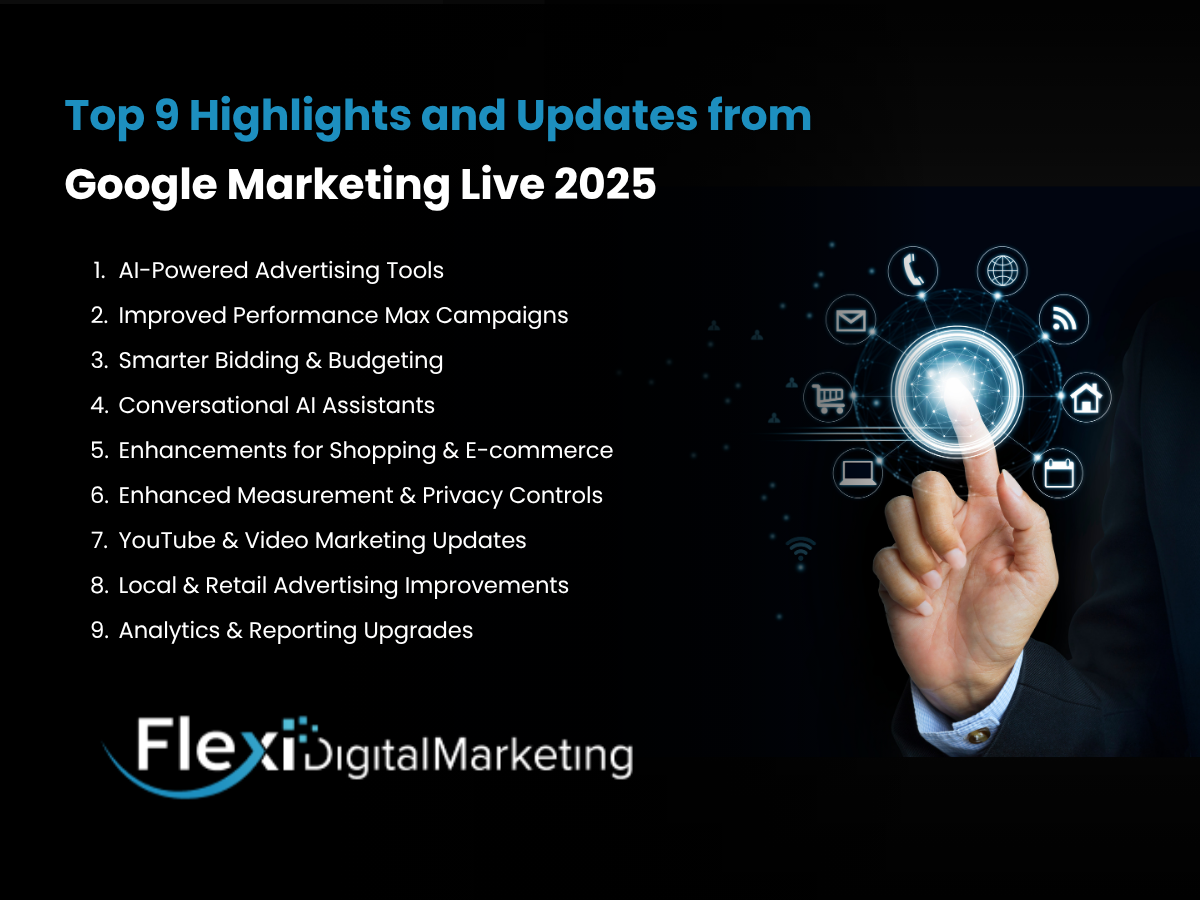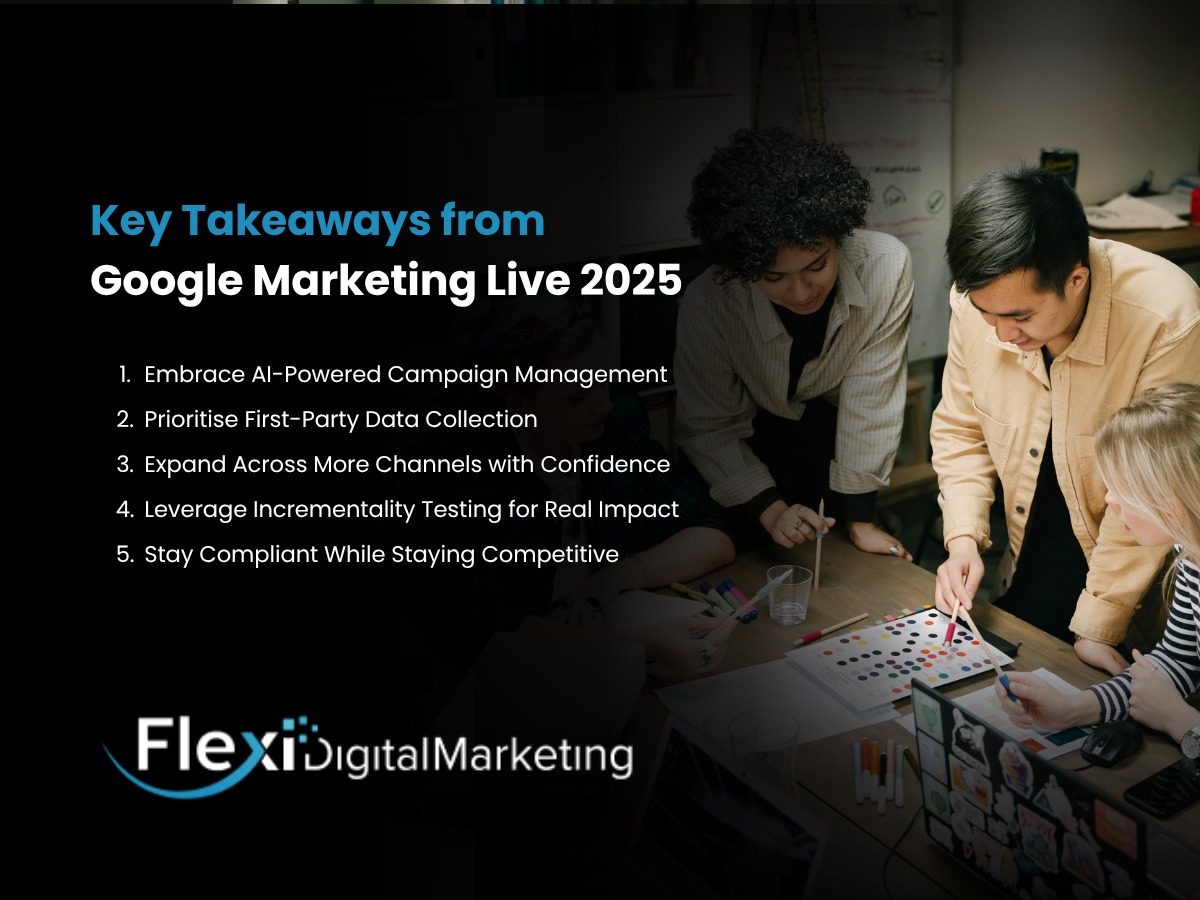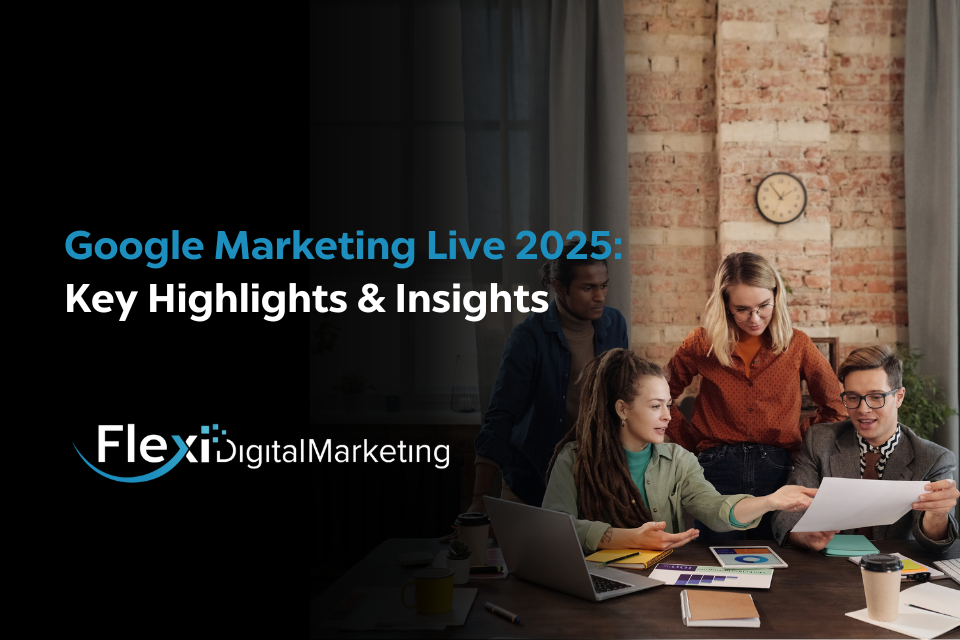Google Marketing Live (GML) 2025 delivered a wave of innovations set to reshape the future of digital advertising. At the heart of it all was the power of AI in digital marketing, supercharging campaign tools, search, video, and measurement. Whether you're a brand marketer, media buyer, or performance advertiser, there’s something here to help you move smarter and faster.
Here's a breakdown of the key highlights and what they mean for marketers moving forward.
Event Theme & Direction
This year’s central theme was crystal clear. AI is reshaping every stage of the advertising process while prioritising user privacy. Google highlighted the importance of moving beyond individual channels to deliver personalised, measurable, and scalable experiences driven by AI-powered marketing automation.
Google’s Vision for the Future of Marketing
Google reaffirmed its mission to help marketers achieve more with AI without compromising privacy, stating:
“Helping marketers unlock more performance, creativity, and insights with the help of AI while respecting user data.”
This commitment signals ongoing investment in first-party data integration, automated creative tools, and AI-driven insights designed to maintain trust and compliance.
Keynote Highlights
- Philipp Schindler, SVP & CBO of Google, opened the keynote with the powerful statement:
“AI is not just changing how we market—it’s changing what’s possible.”
- Vidhya Srinivasan, VP/GM of Ads, introduced Gemini in Google Ads, which enables creating complete Performance Max campaigns in real time using just a website URL.
- Shashi Thakur, VP/GM of Search Ads, detailed the integration of ads into AI Overviews, marking a new phase for sponsored search.
Together, these keynotes highlighted that the future of Google Ads is AI-native, privacy-first, and designed to accelerate marketing performance with smarter automation.
Top 9 Highlights & Updates from Google Marketing Live 2025
Google Marketing Live 2025 introduced a range of new tools and updates designed to help marketers work smarter and reach customers more effectively.

1. AI-Powered Advertising Tools
Google is tapping into AI to make ads smarter and more personalised. Tools like AI Overviews (AIOs) blend educational and commercial content, making ads feel more relevant to users. AI Max campaigns take it further by using machine learning to find the best mix of visuals, headlines, and keywords for higher performance.
Managing ad campaigns is also getting easier. Google’s new Power Pack tool merges Performance Max, AI Max, and Demand Gen campaigns into a single, streamlined setup. This simplifies campaign management while maximising reach and results through AI-driven automation
2. Improved Performance Max Campaigns
Performance Max campaigns now offer better reporting by showing how ads perform across different channels. Marketers can also improve targeting with updated audience options. Demand Gen campaigns have been enhanced to better engage users on YouTube, Gmail, and Discovery feeds.
3. Smarter Bidding & Budgeting
Google introduced Smart Bidding Exploration, a tool that helps marketers test new bidding strategies and find new audiences. Improved machine learning makes bidding more precise, while new Return on Ad Spend (ROAS) options help set clearer performance goals.
4. Conversational AI Assistants
Google’s new AI assistants help marketers analyse campaign data and uncover quick insights through the Marketing Advisor Chrome extension. These tools streamline campaign management and troubleshooting in real time. It’s all part of Google’s push to strengthen its digital marketing solutions, making campaigns smarter, faster, and more personalised.
5. Enhancements for Shopping & E-commerce
New AI tools improve shopping experiences by offering virtual try-ons, dynamic pricing, and personalised product recommendations. Google also introduced Shoppable Masthead Ads on YouTube mobile, allowing shoppers to buy directly from ads. The integration with Google’s Shopping Graph makes product data smarter and easier to use.
6. Enhanced Measurement & Privacy Controls
Google's Marketing Live 2025 introduced significant advancements in measurement and privacy, empowering marketers to optimise campaigns while prioritising user trust.
- Data Manager: Centralised First-Party Data Integration: The new Data Manager tool enables advertisers to consolidate first-party data from various sources, including Salesforce, HubSpot, Shopify, and BigQuery, into a unified analytics hub. This integration facilitates comprehensive audience insights and streamlined campaign management.
- Incrementality Testing: Accessible & Efficient: Google has lowered the minimum budget requirement for incrementality testing to $5,000, making it accessible to a broader range of advertisers. Utilising a Bayesian methodology, these tests provide faster and more reliable insights into campaign effectiveness, with durations ranging from 7 to 56 days.
- Cross-Channel Measurement: Expanded Insights: Google Analytics 4 (GA4) now offers enhanced cross-channel measurement, including impressions from platforms like Pinterest and Reddit. This expansion allows marketers to gain a more holistic view of customer interactions across various touchpoints, improving attribution and ROI analysis.
- Privacy-Focused Data Handling: In line with global privacy standards, Google's measurement tools incorporate privacy-preserving features, such as confidential computing, to ensure secure handling of user data. These measures align with Google's commitment to user privacy while providing marketers with actionable insights.
7. YouTube & Video Marketing Updates
New advertising options for YouTube Shorts and improved tools for working with creators were announced. AI tools can now automatically create video ads from images, making it easier and faster to produce video content for campaigns.
8. Local & Retail Advertising Improvements
Google expanded local inventory ads and improved ways to measure store visits. Their retail media network now offers better targeting options, and AI helps optimise product feeds so retailers can show the most relevant items to customers in real time.
9. Analytics & Reporting Upgrades
Google Analytics got new dashboards and visual tools to make campaign data easier to understand. AI-powered insights automatically highlight important trends and issues. Improved attribution models give a clearer picture of how customers interact with ads across different devices and channels.
Key Takeaways from Google Marketing Live 2025
AI is revolutionising marketing, making campaigns more intelligent and efficient. Here’s what you need to know to stay ahead and make the most of Google’s latest innovations.

1. Embrace AI-Powered Campaign Management
AI is now central to how Google Ads works—from campaign creation to performance insights. Tools like Gemini and Performance Max help marketers optimise ads faster with less manual effort. Leaning into automation means more time for strategy, less on repetitive tasks.
2. Prioritise First-Party Data Collection
As third-party cookies phase out, first-party data becomes your most valuable asset. Google’s new Data Manager makes it easier to connect platforms like Salesforce and HubSpot for better audience insights. Marketers who invest in data quality today will lead tomorrow’s privacy-first landscape.
3. Expand Across More Channels with Confidence
Google now supports cross-channel measurement across platforms like Pinterest and Reddit. This helps advertisers understand where their audience is and what’s driving conversions. Unified reporting means smarter decisions across multiple platforms.
4. Leverage Incrementality Testing for Real Impact
New incrementality testing features let you measure the true effect of your campaigns—even on smaller budgets. You’ll know what’s working beyond just clicks and views. That means better ROI and smarter campaign scaling.
5. Stay Compliant While Staying Competitive
Privacy isn’t optional—it’s foundational to trust and performance. Google’s privacy-safe solutions let you track success while respecting user consent. The best marketers will be those who balance personalisation with protection.
Final Thoughts
Google Marketing Live 2025 showed that AI isn’t just influencing the future of marketing, it is actively shaping it. From building campaigns to measuring results, Google's latest tools are designed to help marketers work smarter, faster and more effectively. Privacy and responsible data use remain central to every innovation.
Looking ahead, success will depend on how well brands embrace AI while maintaining customer trust. Whether you are refining your strategy, scaling campaigns or exploring new channels, the path forward is clear. Focus on automation, strengthen your data practices and stay ready for what comes next.
Ready to take your marketing to the next level? Contact us to get expert support in implementing Google’s latest AI tools and strategies!


